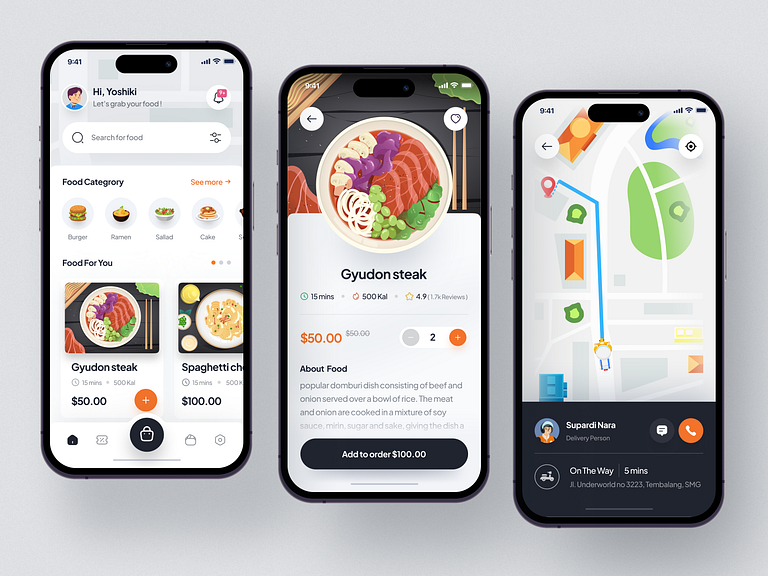In the rapidly evolving world of food delivery services, leveraging the right technology can make or break your business. Cloud-based solutions have emerged as a game-changer, offering a range of benefits that can enhance your food delivery app’s performance, scalability, and overall user experience. In this blog, we’ll explore how cloud-based solutions can transform your food delivery app and why they are an essential component for modern, efficient operations.
- Scalability and Flexibility
Adapting to Demand
One of the most significant advantages of cloud-based solutions is their scalability. With cloud infrastructure, you can easily scale resources up or down based on demand. This is particularly valuable for food delivery apps, where user activity can fluctuate significantly during peak times, such as lunch hours or weekends.
Elastic Resources
Cloud services offer elastic resources, allowing you to add more computing power or storage as needed without investing in physical hardware. This flexibility ensures that your app can handle increased traffic without performance degradation, providing a smooth and reliable experience for users.
- Cost Efficiency
Pay-as-You-Go Model
Cloud-based solutions often operate on a pay-as-you-go model, which means you only pay for the resources you actually use. This is a departure from traditional infrastructure investments, which require significant upfront costs and ongoing maintenance expenses. For a food delivery app, this translates to lower operational costs and the ability to allocate budget more efficiently.
Reduced Maintenance
Cloud providers handle hardware maintenance, software updates, and security patches, reducing the need for an in-house IT team. This allows you to focus on enhancing your app’s features and user experience rather than dealing with infrastructure issues.
- Enhanced Performance and Reliability
Global Reach
Cloud services offer a global network of data centers, ensuring that your app’s performance remains consistent no matter where your users are located. This global reach helps in reducing latency and improving load times, leading to a better user experience.
High Availability
Cloud providers typically offer high availability and redundancy features. This means your app can benefit from automatic failover and backup solutions, ensuring that your services remain accessible even in the event of a hardware failure or other disruptions.
- Improved Security
Advanced Security Measures
Cloud providers invest heavily in security and offer advanced measures such as data encryption, network firewalls, and intrusion detection systems. These features help protect sensitive information, including user data and payment details, against cyber threats.
Compliance and Certifications
Many cloud providers comply with industry standards and regulations, such as GDPR, HIPAA, and PCI DSS. Leveraging these certifications can help your food delivery app meet legal requirements and build trust with your users.
- Seamless Integration
APIs and Services
Cloud platforms offer a range of APIs and services that can be easily integrated into your food delivery app. This includes tools for analytics, payment processing, push notifications, and more. Seamless integration with these services can enhance your app’s functionality and provide a richer user experience.
Third-Party Solutions
Cloud-based solutions often support integration with various third-party applications and services, such as CRM systems, marketing tools, and data analytics platforms. This interoperability allows you to create a more comprehensive ecosystem around your food delivery app.
- Data Management and Analytics
Real-Time Data Access
Cloud-based solutions enable real-time data access and management, allowing you to monitor app performance, user behavior, and operational metrics on-the-fly. This real-time visibility helps in making informed decisions and responding quickly to changing trends.
Advanced Analytics
Cloud platforms offer powerful analytics tools that can help you gain insights into user preferences, delivery patterns, and operational efficiency. Leveraging these insights can drive data-driven decisions, improve customer satisfaction, and optimize your delivery processes.
- Disaster Recovery and Backup
Automated Backups
Cloud providers typically offer automated backup solutions, ensuring that your app’s data is regularly saved and can be restored quickly in case of data loss or corruption. This reduces the risk of downtime and data loss, providing peace of mind for both you and your users.
Disaster Recovery Planning
Many cloud services include disaster recovery options, allowing you to create and implement a robust recovery plan. This ensures that your app can quickly recover from unexpected disruptions, minimizing downtime and maintaining service continuity.
Conclusion
Cloud-based solutions offer numerous benefits for food delivery apps, ranging from scalability and cost efficiency to enhanced performance and security. By leveraging cloud technology, you can ensure that your app remains agile, reliable, and capable of meeting the evolving needs of your users. As the food delivery industry continues to grow, adopting cloud-based solutions will not only help you stay competitive but also drive innovation and improve overall user satisfaction.
Investing in the right cloud infrastructure is a strategic move that can position your food delivery app for long-term success. Embrace the power of the cloud, and watch your app thrive in today’s dynamic market.
Partnering with a Food Delivery App Development Company ensures a tailored, high-performance app that meets your business goals. Their expertise in real-time tracking, cloud integration, and user experience can drive growth and customer satisfaction. Invest in the right development partner to elevate your app and stay ahead in the competitive market.






